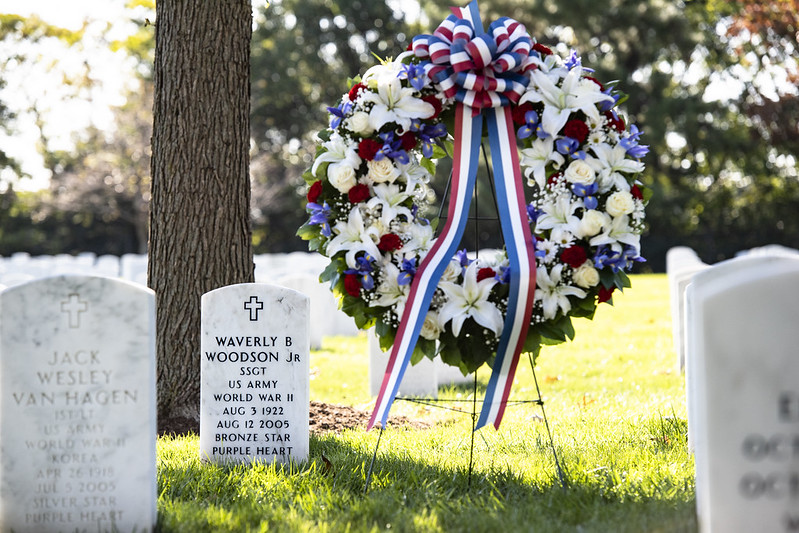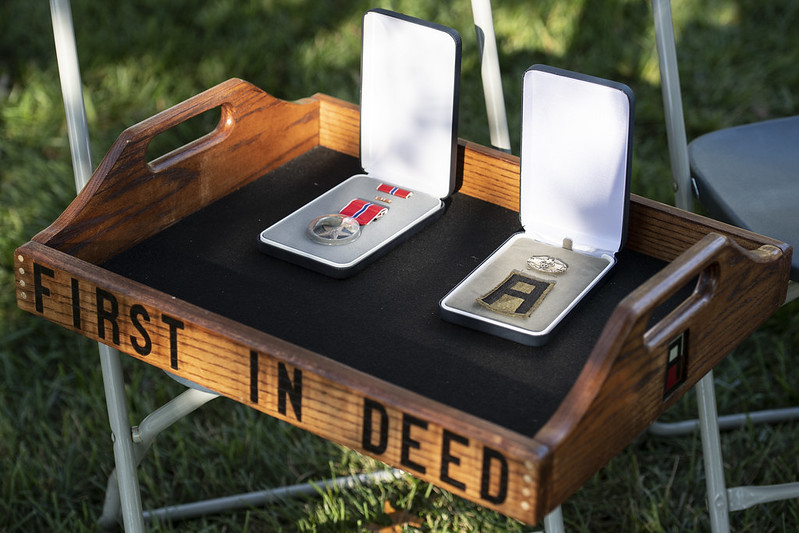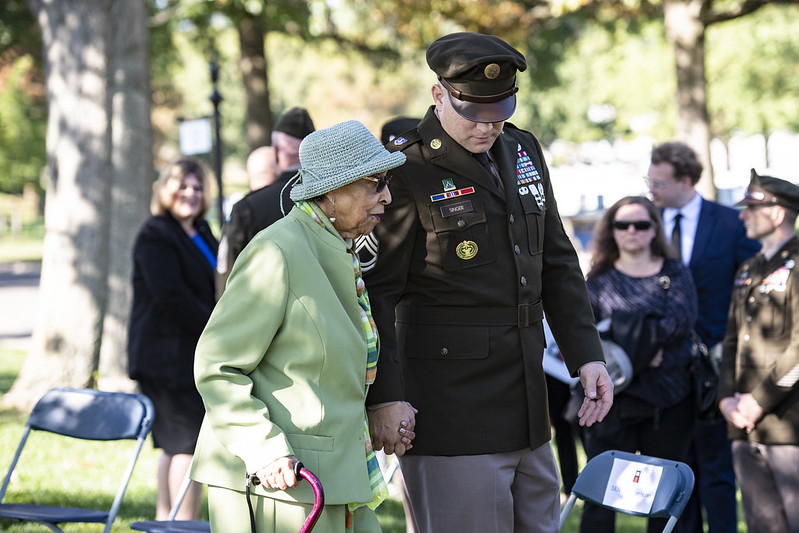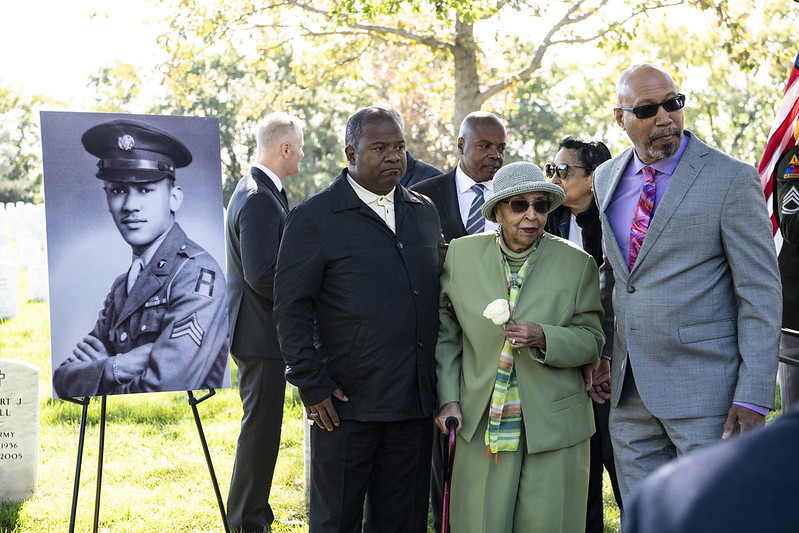
As Cpl. Waverly Woodson, a Black U.S. Army medic, attended to one wounded American soldier after the next on Omaha Beach in Normandy, France, on D-Day, June 6, 1944, he cared only about their injuries, not the color of their skin. While exposed to enemy fire and ignoring the shrapnel in his lower back and thigh, he set and amputated limbs, extracted bullets and dispensed plasma. He even pulled three soldiers out of the English Channel’s rising tide.
Woodson, a medic with the 320th Barrage Balloon Battalion—the only Black unit to land on Omaha Beach on D-Day—had been wounded by enemy fire before he reached the beach. The landing craft tank (LCT) that brought him to shore hit a German underwater mine. Next, enemy artillery fire exploded around the LCT, killing the man next to Woodson and wounding him so badly he feared he was dying. Yet, when the ramp lowered, Woodson raced onto the shore and treated every soldier he saw. For 30 hours, he did his best to keep men alive until he collapsed from exhaustion and his own wounds.
Born in 1922, Woodson grew up in a segregated United States, where he faced racial prejudice, injustice, and discrimination. He joined a segregated U.S. Army, and he faced the same system of prejudice when he came home from World War II. As enemy artillery exploded and machine gun fire stitched the sand, no one asked for a white medic, and nor did Woodson ask if anyone wanted a Black medic. They were all American soldiers facing a common foe. Woodson’s actions, as much as those of any combat soldier, helped turn the tide of World War II. Yet Woodson was never recognized for his bravery.

That changed on Oct. 11, 2023, when Command Sgt. Maj. Christopher Prosser presented a Bronze Star and the Combat Medical Badge to Woodson’s wife, Joann Woodson, in Section 69 of Arlington National Cemetery. About 50 family members, friends and uniformed soldiers, mostly from the 1st Army, gathered near Woodson’s gravesite for the awards ceremony and to remember his selfless deeds. A U.S. senator, two retired Army generals and Woodson’s son spoke at the event.
Retired Lt. Gen. Stephen M. Twitty, who once commanded the 1st Army, spoke about the equality that results from combat. “In war, you don’t look over to the left and the right to see color because you’re at the mercy of your friends and colleagues on the battlefield,” he said. “And so, for one day out of his 83 years, I would surmise that he felt equal as a human being.”
Twitty talked about hope in the face of racism, using his own grandfather as an example. His grandfather, who spent 11 years in the Army as a private, whispered to Twitty, then eight years old, from his deathbed, “You’re going to join the Army one day and you’re going to rise to the rank of sergeant.” His grandfather could not foresee a Black man becoming an officer, much less a general. He told the crowd, “I stand before you today as a Black general officer having commanded 1st Army, the very same unit in which your family member was discriminated [against], segregated, faced injustice, and prejudice—the very same unit.” Why would anyone join a segregated military, he asked, and then responded: “It is hope.” Twitty then explained that people like Woodson and his grandfather made it possible for him to succeed. “I would not be here today if it wasn’t for those who plowed the way for me.”
Retired Lt. Gen. Thomas S. James, Jr., who commanded 1st Army after Twitty, spoke about what he would tell Woodson about the Army if he were alive today. “It is a force representative of our national diversity, where all are valued and can rise to any rank and any career field,” he said. He added that he had been honored, in 2021, to participate in the renaming the 1st Army medical center, now the Waverly Woodson Health Clinic. “We stand on the shoulders of giants,” James concluded. “Staff Sergeant Waverly Woodson may rise above them all.”

With the official speeches concluded, Command Sgt. Maj. Prosser presented each award to Mrs. Woodson. As he dropped to one knee to hand each to her, the citations were ready by Cpt. Kevin Braafladt, the deputy historian for the U.S. Army Sustainment Command, who had spent years researching Woodson’s heroics.
Woodson’s son, Steve Woodson, recalled, “One thing about my dad that I will always remember was his care for other people, and it did not matter the race of the person.” He pointed out his nephew, Brian Williams, who had spent five years in the Marine Corps. “Dad talked about you often, he was extremely proud of you,” said Woodson.
Command Sgt. Maj. Prosser escorted Mrs. Woodson and a few of her family members to her husband’s headstone, where she laid a wreath as an Army bugler sounded Taps.
When the event ended, Mrs. Woodson explained why she laid her husband to rest at Arlington National Cemetery. “I felt he deserved to be here,” she said, adding that Woodson’s brother had been a Tuskegee Airman. “The military runs in our family.”
